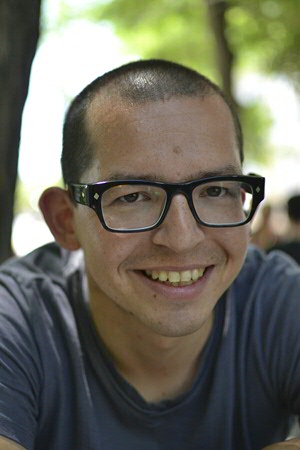Lecturer’s Blog 1: Podcast-style lectures with Richard Jong-A-Pin
'When the outbreak of the Corona pandemic forced us to switch to online teaching about a year ago, I asked myself the question: "why is it that I am unable to focus when I listen to an online lecture for a few minutes and why can I listen to a podcast all day long?'
Instead of trying to answer the question, I took it as a stylized fact and started to think about an alternative way of lecturing. I studied successful podcasts and some of the vlogs that my kids like to (binge) watch on YouTube. I did not find a recipe for success, but what I did notice is that successful podcasts and vlogs do not only provide high quality content (like good lectures do), but that they are conversational, and are (deeply) personal. Furthermore, they regularly contain surprise elements that make you want to listen more, and listen again in the future. It got me thinking how to make this possible in the online university classroom? And if so, would it crowd-out regular course content? Would it be effective? Would it be appreciated?
I entertained myself with the idea of launching a new teaching phenomenon: 'Podcast-style Teaching', as a supplement to pre-recorded lectures and next to online tutorials in which class assignments are discussed. Podcast-style teaching in which the lecturer invites guests (or co-lecturers) to talk about course content: things like its relevance, its accuracy, its beauty. And I thought it would be really cool if students would feel invited to participate in these conversations (via the mic or chat box). To trigger students to participate, I started to think of topics that would engage them. Perhaps the news of the day (on inflation, unemployment and other economic variables) and its relation to the course models? Perhaps COVID and the Macroeconomy? Perhaps the usefulness of economics more generally in life? Honestly, I did not have a clue what could work.
With the (moral) support of my Macroeconomics teaching team, I decided to give it a try and prepared the first episode of 'The Macro Show' to figure out whether students would like it and to see what could possibly work and what not. With the theme of the first episode “How to pass this course”, I gave students an instrumental reason to attend the (additional) lecture and about 90 students logged in (even though it was also recorded). Within an hour, I tried to share my experiences (as a former student and as a teacher) regarding the course and invited students to ask questions. Quite spontaneously, I said something like 'it could be about anything.' That was a game-changer.
The floor was open and I found out that the students wanted to interact – about everything! So, guess what we talked about the next episodes? Everything: we talked about interesting features of macroeconomic models; about macroeconomic policy; about the influence of celebrities on science (like, e.g., the Maradona-effect in monetary policy making or the David Bowie effect in record sales); about how to become successful as a student and later in life (I wish I had the answer); about (the currently non-existent) university life; about Groningen; about the life of a university teacher; about our favorite (economics) books; about sports; about the US elections, and, of course, we talked a lot about Corona and the lockdown. It was very useful (I would almost say therapeutic) to share our frustrations, the hardship of being isolated, the challenge to stay motivated, etc.
After six episodes and two guest lectures (that were also almost podcast-like), the course came to an end. The podcast-style lectures had high quality content and had (unexpectedly) become deeply personal. To me they they were a success, but what did the students think?
A few days ago, I received the official course evaluation. The podcast was explicitly mentioned several times with qualifications like 'clarifying', 'fun', 'enjoyable', 'engaging', 'refreshing', 'entertaining', 'interactive', 'interesting' and one student even called it 'the best online experience so far'.
Based on the feedback I received I know that the Podcast-style teaching technique is here to stay and as one anonymous student in the evaluation put it: 'I would not mind if other professors would copy this idea.'
Richard Jong-A-Pin
I would like to pass on the honor of writing a teaching blog to (in my view) one of the most talented and skillful teachers of FEB: dr. Maite Laméris of the GEM department.

